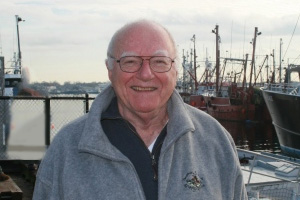WASHINGTON (Saving Seafood) – January 8, 2018 – Last week, Dr. Ray Hilborn, a professor at the University of Washington’s School of Aquatic and Fishery Sciences, presented on U.S. fisheries policy and how scientists can communicate with Congress to promote good decision-making. The lecture, “Is U.S. Fisheries Policy Working? Getting the Message to Congress,” was the first of the 2018 Bevan Series on fisheries management.
The Bevan Series features “internationally recognized experts” discussing current issues facing fisheries and marine conservation. This year’s series features 10 weekly seminars held at the University of Washington in Seattle.
Read more about the Bevan Series here
Watch Dr. Hilborn’s lecture here
A description of Dr. Hilborn’s lecture is below:
The Magnuson-Stevens Fisheries Management and Conservation Act of 1976 is the primary piece of federal legislation governing fisheries whose objectives include: exploring, exploiting, conserving, and managing all fish within the exclusive economic zone; to promote domestic commercial and recreational fishing under sound conservation and management principles; to provide for the preparation and implementation, in accordance with national standards, of fishery management plans which will achieve and maintain, on a continuing basis, the optimum yield from each fishery; to encourage the development by the United States fishing industry of fisheries which are currently underutilized or not utilized by United States fishermen. Optimum yield is defined the yield from a fishery, means the amount of fish which will provide the greatest overall benefit to the Nation, particularly with respect to food production and recreational opportunities, and taking into account the protection of marine ecosystems.
This talk will focus on how the U.S. is doing with respect to these objectives, and my perspective on how scientists can let Congress know how well we are doing, and help Congress make good decisions. I will discuss the success at rebuilding fish stocks and protection of marine ecosystems, a mix of success and failure at producing benefits to food production, and recreational fishing opportunities. I will discuss my limited experiences at communicating with Congress through invited testimony to House and Senate committee hearings over 25 years, and two separate briefings of Congressional staff.
Ray Hilborn is a Professor in the School of Aquatic and Fishery Sciences, University of Washington specializing in natural resource management and conservation. He authored several books including Overfishing: What Everyone Needs to Know (with Ulrike Hilborn) in 2012, Quantitative Fisheries Stock Assessment with Carl Walters in 1992, and The Ecological Detective: Confronting Models With Data with Marc Mangel, in 1997. He has also published over 300 peer reviewed articles and served on the Editorial Boards of numerous journals, including seven years on the Board of Reviewing Editors of Science Magazine. He has received the Volvo Environmental Prize, the American Fisheries Societies Award of Excellence, The Ecological Society of America’s Sustainability Science Award, and the International Fisheries Science Prize. He is a Fellow of the American Fisheries Society, the Washington State Academy of Sciences, the Royal Society of Canada and the American Academy of Arts and Sciences.

